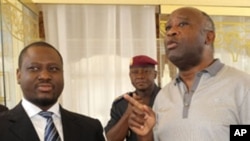Ivorians continue to wait for Prime Minister Guillaume Soro to announce a new government, as violence and political unrest mount in the country's interior.
Ivory Coast has been without a government for a week now, since President Laurent Gbagbo dissolved it and the independent electoral commission last Friday, further deepening a political crisis over alleged fraud in the country's voter list.
Mr. Gbagbo had accused the electoral commission of approving a voter list containing almost half a million foreigners.
Leaving a meeting with Mr. Gbagbo Thursday in the country's capital, Yamoussoukro, the prime minister said the president had agreed to give him until Saturday to declare a new government.
He says he and the president want peace and are in the process of finding the means to achieve that peace and a way for all Ivorians to come together calmly in the construction of a lasting peace. He asks Ivorians to remain not only calm but also hopeful. He says they will do everything necessary so that no one will be left out and so that Ivory Coast will emerge from this crisis.
A coalition of opposition parties says it no longer recognizes Mr. Gbagbo as head of state and will not take part in the new government.
Opposition leaders called on their supporters to take to the streets in protest and say they will not negotiate with the prime minister until the original electoral commission is reinstated.
Opposition members have dismissed Mr. Gbagbo's fraud accusations against the electoral commission and his dissolution of the government as an attempt to stall the country's long-delayed presidential elections to remain in power.
But Ivorian presidential advisor, Lambert Bahi Sery, told Voice of America the president acted within his constitutional rights in dissolving the government and electoral commission in the hopes of getting Ivory Coast back on track to holding free and transparent elections this year.
The presidential poll is an attempt to find a lasting political solution to nearly a decade of internal conflict, but it has been pushed back several times since Mr. Gbagbo's mandate ran out in 2005.
Frustration over the current political crisis and increased electricity cuts have erupted into demonstrations around Ivory Coast.
Thousands have taken to the streets in the last week. Though the protests have remained for the large part peaceful, some have turned violent, marked by acts of vandalism and protestors blocking roads and burning tires.
In Mr. Gbagbo's hometown, Gagnoa, in central Ivory Coast, opposition sources say three protesters were killed and several were wounded Friday when security forces opened fire.
Ivory Coast's military chief, General Philippe Mangou, said security forces would defend the state against civil unrest but has encouraged his forces to act in accordance with the law.
International pressure continues to mount for Ivory Coast to resolve the crisis and move forward in the electoral process.
Ivory Coast Without Government for a Week, Tensions Mount










